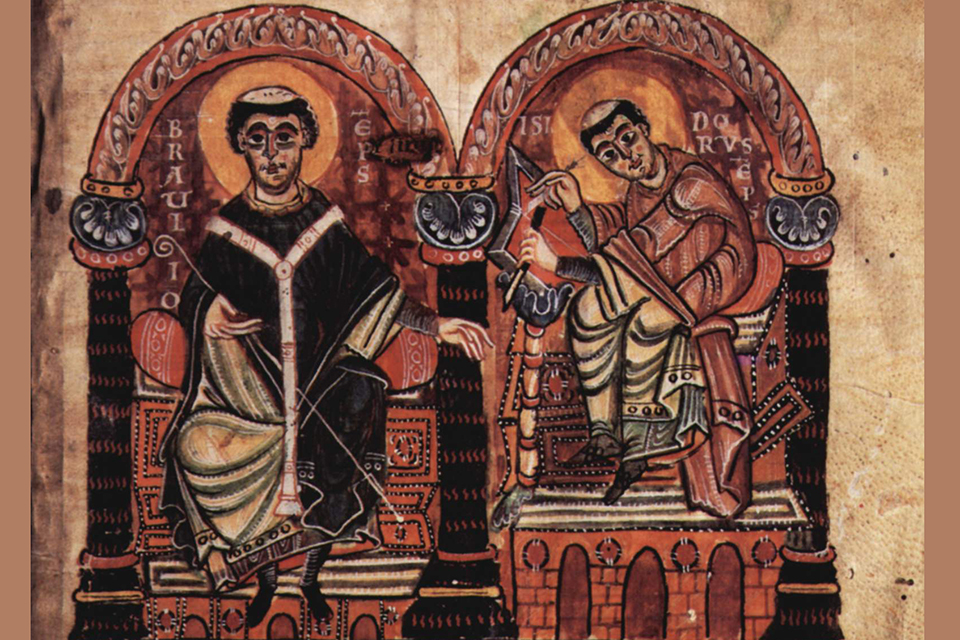Isidore of Seville was a renowned scholar, theologian, and archbishop who lived in Visigothic Iberia from around AD 560 to 636. He had a profound influence on education and scholarship in Medieval Europe.
Isidore was born in Cartagena, Spain to a prominent Hispano-Roman family. His older brother Leander served as the Archbishop of Seville and played a key role in Isidore’s education and religious formation. After Leander’s death around 600 CE, Isidore succeeded him as Archbishop of Seville, a position he would hold for nearly four decades until his own death.
As Archbishop, Isidore worked to strengthen religious discipline and education throughout his diocese. He presided over several important church councils, including the Second Council of Seville in 619 and the Fourth Council of Toledo in 633. The Fourth Council of Toledo was particularly significant, as it decreed union between church and state, established uniform practices for the Spanish mass, and promoted toleration of Jews.
The Etymologies
Isidore was a prolific writer and produced works on a wide range of subjects including theology, history, grammar, and natural science. His most famous and influential work was the Etymologies (also known as the Origins), a vast encyclopedia that aimed to compile all known learning of the time. The Etymologies covered topics like the seven liberal arts, medicine, law, languages, geography, and much more. It became one of the most studied texts in medieval Europe, with nearly 1,000 manuscript copies surviving from the Middle Ages. As such, the Etymoligies forged the cultural ethos of the learned community until the Renaissance.
Some of Isidore’s other important works include:
- Historia de regibus Gothorum, Vandalorum et Suevorum – A history of the Gothic, Vandal and Suevi kings
- De natura rerum – A book on astronomy and natural history
- De ecclesiasticis officiis – A treatise on church offices and duties
- Sententiae – A handbook of Christian doctrine and morals
- De viris illustribus – Biographies of famous Christian writers
Isidore was renowned for his vast learning and was sometimes referred to as “the Schoolmaster of the Middle Ages”.He played a crucial role in preserving and transmitting classical and patristic knowledge during a time of cultural transition in Europe. His writings served as important reference works and textbooks for centuries after his death. In addition to his scholarly pursuits, Isidore was known for his piety and commitment to monastic ideals. He established a school in Seville that became an important center of learning.
Isidore also worked to improve the material and spiritual welfare of the people in his diocese, establishing charitable organizations to support the poor and marginalized. Isidore died on April 4, 636 in Seville. He was quickly venerated as a saint, with his feast day celebrated on April 4th in the Catholic and Eastern Orthodox churches. In 1722, he was declared a Doctor of the Church by Pope Innocent XIII in recognition of his theological writings and influence. Isidore’s legacy lived on long after his death through the enduring popularity and influence of his writings, especially the Etymologies.
He helped preserve classical learning during the transition to the medieval period and shaped education and scholarship for centuries to come. Isidore is considered one of the most learned men of his age and a key figure in the intellectual history of early medieval Europe.
Five Important Books on Isidore of Seville
By Andrew Fear
Series: Brill’s Companions to the Christian Tradition vol 87)
Brill 2019
By Andrew Fear and Jamie Wood (2016)
Amsterdam University Press 2016
This scholarly volume examines Isidore’s works and their transmission and influence in the early medieval period. It provides insight into how Isidore’s writings were received, interpreted and utilized by later generations.
Translated by Stephen A. Barney, W.J. Lewis, J.A. Beach and Oliver Berghof
CUP 2006
This is the first complete English translation of Isidore’s most famous work. It makes the full text of the Etymologies accessible to modern readers and includes helpful notes and commentary.
Translated by Thomas L. Knoebel
The Newman Press 2008
This book provides an English translation and analysis of one of Isidore’s important theological works on church offices and liturgy. It sheds light on early medieval church practices and Isidore’s role as a religious leader.
By John Henderson
CUP (2007)
Henderson’s book examines Isidore’s life and works in the context of early medieval Spanish culture. It explores how Isidore synthesized classical and Christian learning in his writings.
By Jamie Wood
Brill 2012
This study focuses on Isidore’s historical writings and how they reflect the political and religious climate of Visigothic Spain. It provides insight into Isidore’s role in shaping cultural identity in early medieval Iberia.
